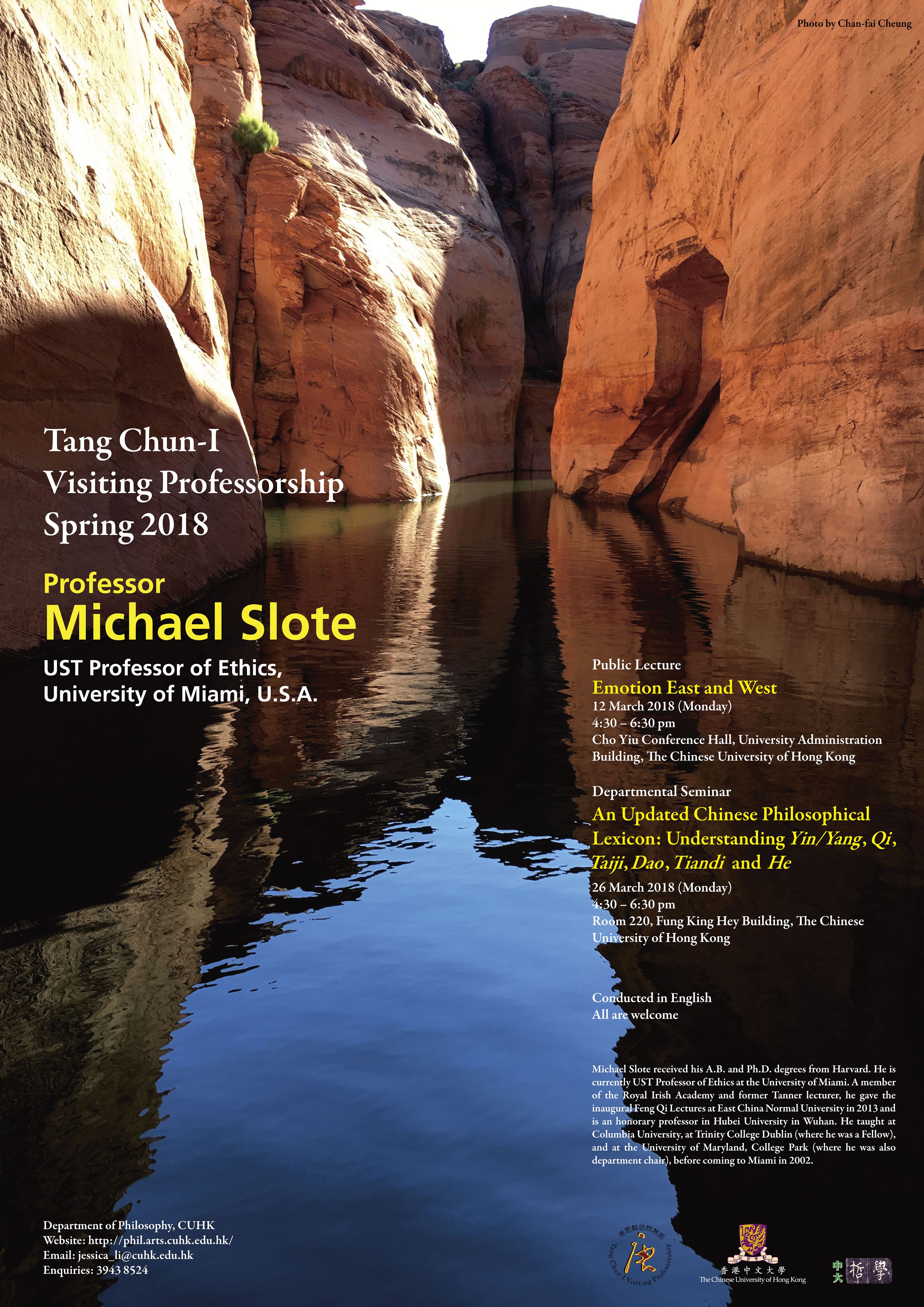唐君毅访问教授系内研讨会:最新中国哲学词汇:对『阴阳』、『气』、『太极』、『道』、『天地』、『和』之理解

斯洛特教授 |
|
4:30 – 6:30 pm |
|
香港中文大学冯景禧楼220室 |
摘要:
Recent Chinese philosophy has to a large extent looked to Western philosophy for guidance, direction, and renewal, but this has involved a neglect of certain Chinese categories that can do a lot of important work for philosophers East and West. However, in order to be thus relevant the categories need to be updated or winnowed. For example, yin and yang are traditionally associated with physical concepts like wet and dry, cold and warm, and Chinese philosophers have, I think, rightly seen that such thinking is not going to be much help to present-day philosophy. But deep within traditional Chinese thinking, there is also a tendency to view yin as something like receptivity and yang as something like directed activity or purpose, and thus understood, yin and yang and yin/yang can, unexpectedly, help us better understand ethics, epistemology, and philosophy of mind.
In ethics, for example, a virtue like compassion or ren has both a yin and yang aspect: involving as it does both empathic receptivity to the suffering of another and motivation directed at helping the other. As with yin and yang, I shall argue that these two sides of compassion and other moral emotions are mutually dependent or complementary. In philosophy of mind, belief and desire are often seen as the main basic elements of psychological functioning, and it can be argued that both these components of the mind or heart-mind involve emotion. Belief is receptive or yin emotion and desire is actively directed yang emotion, and given these two complementary forms of emotion, it is natural to think that there is something more general that can be called emotionality and that can assume these different and complementary emotional forms. And emotionality can be equated with qi as it appears within the heart-mind.
Dao is a much honored and central notion in Chinese thought, but it doesn’t as such mandate any specific qualities as virtues or any specific actions as morally incumbent on us. By contrast, I argue, yin/yang enables us to explain how and why compassion, etc., are virtues. It thus does more moral-theoretic work for us, but it is then possible to understand Dao in the light of the foundational emphasis on yin/yang. Dao may make no specific moral recommendations, but it does embody the idea that truly understanding the ultimate order of things necessitates a commitment to living in accordance with that order. This means that if we are really receptive to how things are we will act virtuously, and in the terms I defend, this also means that Dao can be understood as the basic idea that yin requires and calls for yang. There is also the idea that yang requires yin, and I believe this fundamental idea is embedded in the concept of Tiandi. The yang of Heavenly activity cannot occur without Earth’s being receptive to that activity, for in the absence of Earth, Heaven has nothing to work on. So in the light of what I have to say about yin/yang we can give Dao and Tiandi philosophically justifiable places within contemporary philosophical thinking.
If time permits, I will extend my yin/yang analysis to the natural world outside mind or xin. If it applies there, then qi and taiji can be thought of as basic to the whole cosmos: both humans and nature—just the way Zho Dunyi thought. But my argument will depend on facts of modern physics Zho was of course unaware of. Newton’s laws instantiate yin and yang, as do familiar laws in chemistry and biology. But then, if both nature and humans exemplify the same basic yin/yang, there is a harmony to the entire universe that Western philosophy has never dreamt of. Chinese thought has traditionally believed in such harmony or he, but it helps to use modern physics and certain Western-style arguments in order to show how and why this is the case. Chinese optimism about the universe and ourselves is to that extent vindicated against pessimistic Western dualism and epistemological skepticism.




